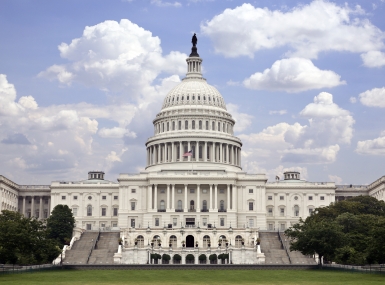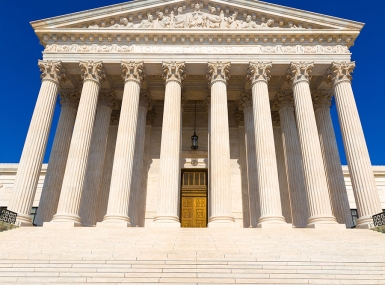On Tap at SCOTUS: Can a WOTUS designation be challenged?

On Tap at SCOTUS: Can a WOTUS designation be challenged?
The State and Local Legal Center (SLLC) has filed an amicus brief in a critical environmental legal battle to determine whether courts can review an Army Corps of Engineers’ “jurisdictional determination” (JD) that property contains “waters of the United States” (WOTUS) per the Clean Water Act.
The issue is at the center of U.S. Army Corps of Engineers v. Hawkes. The Hawkes Company wanted to mine peat from its wetland property in Minnesota. The Corps issued a JD that the property contained “waters of the United States” because it was connected by culverts and unnamed streams to a traditional navigable water way, the Red River, about 120 miles away.
To start mining, Hawkes would have had to obtain a costly and time-consuming permit unless a court would review and possibly overturn the JD. So Hawkes sought court review.
According to the Administrative Procedures Act, a judicial review may be sought only for final agency actions. The 8th U.S. Circuit Court of Appeals ruled that Hawkes could challenge the JD in court immediately and not wait until the permit was denied to sue.
The court concluded that “rights or obligations have been determined” and “legal consequences flow” from a JD because Hawkes’ two choices after a determination are cost prohibitive. The company could complete the permitting process, which would be costly, time-consuming and according to the Corps, futile. Or it could proceed without a permit and risk an enforcement action that could include criminal monetary penalties or imprisonment for knowingly violating the Clean Water Act.
The SLLC amicus brief claims that states and local governments would be negatively affected in their various roles if judicial review of JDs were not possible. As landowners, they face timing and cost burdens. If they choose to proceed with a project without a permit, they could lose the federal grant funding necessary to complete the project.
As a partner with the business community responsible for economic development and capital infrastructure planning, states and local governments need the certainty provided by prompt judicial review of JDs.
NACo, the Council of State Governments, National League of Cities, United States Conference of Mayors, International City/County Management Association, and the International Municipal Lawyers Association joined SLLC brief.
'Fair Share' remains OK in public sector unions case
Public sector unions and “fair share” dues are safe — for now. In a 4–4 decision, the U.S. Supreme Court issued an opinion affirming a appeals court’s ruling in the case Friedrichs v. California Teachers Association.
In Friedrichs, the court was contemplating overruling a nearly 40-year-old precedent, established in Abood v. Detroit Board of Education in 1977, requiring public sector employees who don’t join the union to pay their “fair share” of collective bargaining costs. More than 20 states have enacted statutes authorizing fair share.
The Supreme Court heard oral argument in this case in January and the then-five more conservative justices seemed poised to overrule Abood. In two recent cases Knox v. SEIU (2012) and Harris v. Quinn (2014), in 5–4 opinions written by Justice Samuel Alito and joined by the other conservative justices, including Justices Antonin Scalia and Anthony Kennedy, the court was very critical of Abood.
However, after Scalia’s death, the court had two choices: wait for a ninth justice to join the court and rehear the case or do what it did — affirm the lower court’s decision. The 9th U.S. Circuit Court of Appeals, in a very brief opinion, had refused to overrule Abood.
Given the uncertainty of when a new justice will be confirmed and the lack of a circuit split on this issue, the Supreme Court’s decision was expected. If a more liberal justice joins the court it is unlikely this issue will be brought before the court again anytime soon.
Attachments
Related News

U.S. Congress passes reconciliation bill: What it means for counties
On July 3, the U.S. Congress passed sweeping budget reconciliation legislation.

White House signs executive orders to advance nuclear power
On May 23, President Trump signed four executive orders focused on expanding the nuclear energy industry. The executive orders aim to position nuclear power as a key contributor to energy reliability, economic growth and national security — especially as artificial intelligence, advanced manufacturing and military operations increase demand for stable, high-density power sources.

U.S. Supreme Court issues unanimous decision in landmark National Environmental Policy Act case
On May 29, the U.S. Supreme Court issued a unanimous decision in Seven County Infrastructure Coalition v. Eagle County, Colorado that will reshape requirements for National Environmental Policy Act (NEPA) environment impact statements.
